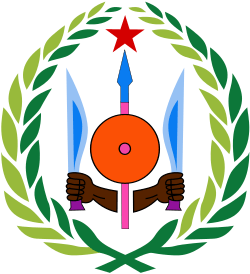National Assembly (Djibouti)
The National Assembly, formerly known as the Chamber of Deputies, is the unicameral legislative branch of the government of Djibouti. It was built and partially financed by the government of Iran and completed in November 23rd, 2014. The debt for this project has still not been paid to this date. Iranian parliament speaker Ali Larijani attended a ceremony to inaugurate this new building and to hand it over.
National Assembly Assemblée nationale الجمعية الوطنية | |
|---|---|
| 6th National Assembly | |
 | |
| Type | |
| Type | |
| History | |
| Founded | 1977 |
| Leadership | |
President of the Assembly | Mohamed Ali Houmed, UMP |
| Structure | |
| Seats | 65 |
_diagram.svg.png) | |
Political groups | Union for the Presidential Majority (43)
Union for National Salvation (21) Unaligned
|
| Elections | |
Last election | February 2018 |
| Meeting place | |
| Assemblee Nationale, Djibouti | |
| Website | |
| www | |
 |
|---|
| This article is part of a series on the politics and government of Djibouti |
|
|
| Constitution |
|
Executive
|
|
Legislature
|
|
|
|
Related topics |
|
|
Overview
It consists of 65 members – 30 Somali (21 Issa) and 30 Afar – elected to serve five-year terms in multi-seat (4 to 37 each) constituencies. The first free multi-party parliamentary election since independence (1977) was held in 2003, with the ruling coalition, led by the People's Rally for Progress (RPP), receiving 62.7% of the vote.
Idriss Arnaoud Ali was President of the National Assembly from 2003 until his death in 2015. He was succeeded by Mohamed Ali Houmed.
For its entire existence, the National Assembly has been dominated by the Popular Rally for Progress, which is presently the senior partner in the Union for a Presidential Majority coalition. From 1981 to 1992, the RPP was the sole legal party. Even after opposition parties were legalized in 1992, the RPP won every seat in the legislature. From 1997 onward, it fought elections as part of a coalition, known since 2003 as the UMP, which continued to sweep every seat. Opposition parties did not manage to enter the legislature until 2013. The Djiboutian political system concentrates most power in the president's hands, and there is little opposition to executive decisions.
Presidents
| Name | Took office | Left office | Notes |
|---|---|---|---|
| Ahmed Dini Ahmed | 13 May 1977 | 13 July 1977 | [1] |
| Saad Warsama Dirie | 1977 | 1979 | [1] |
| Abdoulkader Waberi Askar | 1979 | 1993 | [1] |
| Said Ibrahim Badoul | 1993 | 2003 | [1] |
| Idriss Arnaoud Ali | 21 January 2003 | 12 February 2015 | |
| Mohamed Ali Houmed | 1 March 2015 | Incumbent | |
External links
References
- "Les Anciens Presidents". National Assembly. 19 April 2016.